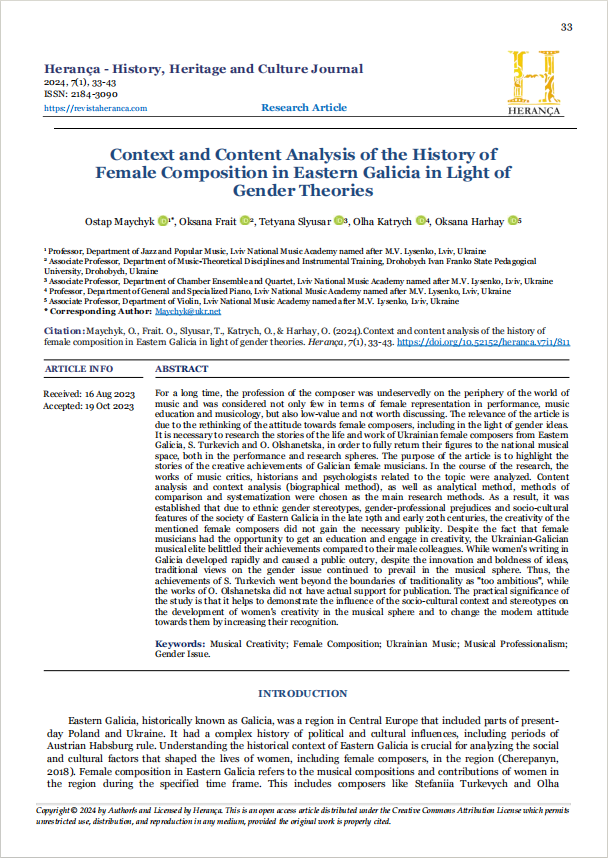Contexto e análise de conteúdo da história da composição
DOI:
https://doi.org/10.52152/heranca.v7i1.811Palavras-chave:
criatividade musical, composição feminina, música ucraniana, profissionalismo musicalResumo
A relevância deste artigo é determinada pela reavaliação das atitudes em relação às compositoras, inclusive à luz das ideias de gênero. O objetivo do artigo é destacar as histórias de realizações criativas de musicistas galegas. O estudo envolveu a análise de obras de críticos musicais, historiadores e psicólogos pertinentes ao tema. Análise de conteúdo, análise contextual (método biográfico), método analítico, método de comparação e método de sistematização foram selecionados como os principais métodos de pesquisa. Como resultado, constatou-se que devido a estereótipos étnicos de gênero, preconceitos gênero-profissionais e peculiaridades socioculturais da sociedade galega oriental do final do século XIX ao início do século XX, a criatividade dos compositores mencionados não recebeu o reconhecimento necessário.
Downloads
Referências
Ageyeva, V. (2003). Women's space: Feminist discourse of Ukrainian modernism. Kyiv, Ukraine: Fact.
Alekseeva, A. (2022). Value-semantic preconditions of professional success of the individual: Gender measure. Scientific Bulletin of Mukachevo State University. Series "Pedagogy and Psychology", 8(4), 43-51.
Bazik, I. (2021). Nocturnes in great variety: Reconsidering the nineteenth-century nocturnes through women composer-pianists. Oakland, CA: University of California Press.
Bohlman, P. V. (2020). World music: A very short introduction. Oxford, UK: Oxford University Press.
Chedoluma, I. (2021). Images and representations of the Rudnytskyi family: The case of Ukrainians in Galicia between the wars. Scripta Judaica Cracoviensia, 18, 49-66.
Cherchovych, I. (2017). Emancipatory ideas vs conservative practices: Women in the environment of the Ukrainian intelligentsia in Galicia in the late 19th – Early 20th centuries. In Ukrainian Women in the Crucible of Modernization (pp. 32-51). Kharkiv, Ukraine: Klub simeynoho dozvillya.
Cherepanyn, М. V. (2018). Artistic palette of cultural life of Stanislavov (Іvano-Frankivsk): historical context and musical professionalism of present days. Scientific Bulletin of Mukachevo State University. Series "Pedagogy and Psychology", 4(1), 68-72.
Czeferner, D., & Baker, C. (2018). Review of gender in 20th century Eastern Europe and the USSR. The Hungarian Historical Review, 7(1), 184-186.
Ellis, K. (1997). Female pianist and their male critics. Journal of the American Musicological Society, 50(2/3), 353-385.
Frait, O. (2018). Mental and socio-historical factors of musical and artistic activities of Ukrainian womanhood. Humanities Science Current Issues, 2(19), 51-55.
Frait, O. (2019). Gender issues in the Ukrainian music journalism of Galicia (of first third of the XX century). Musicological Universum: Scientific Collection of the Lviv National Music Academy named after M.V. Lysenko, 45, 16-28.
Göttler, A. (2023). Ethnic belonging, traditional cultures and intercultural access: the discursive construction of older immigrants' ethnicity and culture. Journal of Ethnic and Migration Studies, 49(9), 2290-2309.
Grynevycheva, K. (2014). Woman-artist in the family. In Heavenly Apple. Anthology of Ukrainian "feminine" prose of Galicia in the interwar period (pp. 260-261). Lviv, Ukraine: LA "Piramida".
Hanson, R. (2023). Chamber music by female composers: A pedagogical analysis and historical overview. American String Teacher, 73(1), 41-48.
Hook, T., & Oane, L. (2022). Women of Europe in the Great War (1914-1918). Foreign Affairs, 32(4).
Katrych, O. (2018). Foreword. Olga Olshanetska. Piano compositions. Toronto, Canada: Authenta.
Khazratova, N. (2020). Gender and age peculiarities of frustrative reaction to privacy violation. Scientific Studios on Social and Political Psychology, 46(49), 124-130.
Kijanowska-Kaminska, L. (2017). The emancipation of women in the musical and artistic milieu of Galicia (on the example of Teodozja Papara and Sałomea Kruszelnicka). In XVI International scientific and practical conference "MUSICA GALICIANA" (pp. 17-36). Rzeszow, Ppland: Musica Galiciana.
Kis, O. (2002). Ethnic gender stereotypes and sources of their construction. In Ukrainian Women's Movement: Achievements and Problems (pp. 20-26). Drohobych, Ukraine: Kolo.
Lyudkevych, S. (1921). Concert of M. Sokil in the national museum. Studies, articles, reviews, performances. Lviv, Ukraine: Dyvosvit.
Martynenko, N. M. (2015). History of Ukrainian culture: Textbook for foreign students. Kharkiv, Ukraine: Kharkiv National Medical University Press.
Matasova, I. (2021). Post-Sovietness of the popular: The west, the Post-Soviet Ukrainian audience, and the major Ukrainian pop star (1990s). In The Post-Chornobyl Library: Ukrainian Postmodernism of the 1990s (pp. 179-200). Boston, MA: Academic Studies Press.
Maychyk, O. (1999). Olshanetska O. piano works. Lviv, Ukraine: O. Maychyk.
Nikulina, V. (2022). Combination of empirical and theoretical knowledge as a problem of piano pedagogy of Ukraine. Scientific Bulletin of Mukachevo State University. Series "Pedagogy and Psychology", 8(1), 63-70.
Pavlyshyn, S. (2004). The first Ukrainian composer Stefania Turkewich-Lysowska-Lukianovych. Lviv, Ukraine: BaK.
Stepanenko, M. (2016). The work of Tymofiy and Yelyzaveta Bilohradsky. In Articles. Research. Memoirs (pp. 90-99). Kyiv, Ukraine: Grono.
Tukova, I. (2020). Treatment of sound in contemporary art music: at the examples of works by Ukrainian composers. In 4th International Conference on Art Studies: Science, Experience, Education (ICASSEE 2020) (pp. 269-276). Amsterdam, Netherlands: Atlantis Press.
Vytvytskyi, V. (2003). Composers and compositresses. In Musicological Works. Journalism (pp. 8-18). Lviv, Ukraine: B. Lekhnyk.
Zavyalova, O., & Stakhevych, H. (2022). Female artist in European fine arts: Gender and professional status. Interdisciplinary Cultural and Humanities Review, 1(1), 20-29.

Downloads
Publicado
Como Citar
Edição
Secção
Licença
Direitos de Autor (c) 2023 Herança - Revista de História, Património e Cultura

Este trabalho encontra-se publicado com a Licença Internacional Creative Commons Atribuição 4.0.






8.png)





